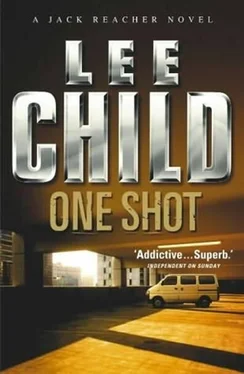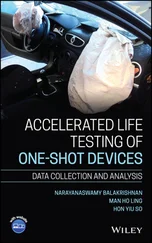Lee Child - One Shot
Здесь есть возможность читать онлайн «Lee Child - One Shot» весь текст электронной книги совершенно бесплатно (целиком полную версию без сокращений). В некоторых случаях можно слушать аудио, скачать через торрент в формате fb2 и присутствует краткое содержание. Жанр: Триллер, на английском языке. Описание произведения, (предисловие) а так же отзывы посетителей доступны на портале библиотеки ЛибКат.
- Название:One Shot
- Автор:
- Жанр:
- Год:неизвестен
- ISBN:нет данных
- Рейтинг книги:4 / 5. Голосов: 1
-
Избранное:Добавить в избранное
- Отзывы:
-
Ваша оценка:
- 80
- 1
- 2
- 3
- 4
- 5
One Shot: краткое содержание, описание и аннотация
Предлагаем к чтению аннотацию, описание, краткое содержание или предисловие (зависит от того, что написал сам автор книги «One Shot»). Если вы не нашли необходимую информацию о книге — напишите в комментариях, мы постараемся отыскать её.
One Shot — читать онлайн бесплатно полную книгу (весь текст) целиком
Ниже представлен текст книги, разбитый по страницам. Система сохранения места последней прочитанной страницы, позволяет с удобством читать онлайн бесплатно книгу «One Shot», без необходимости каждый раз заново искать на чём Вы остановились. Поставьте закладку, и сможете в любой момент перейти на страницу, на которой закончили чтение.
Интервал:
Закладка:
“We need to find this Jack Reacher person,” Rosemary Barr said.
Helen nodded. “I gave his name to Emerson and my father.”
“Why?”
“Because Emerson’s people cleared your brother’s house out. They might have found an address or a phone number. And my father needed to know because we want this guy on our witness list, not the prosecution’s. Because he might be able to help us.”
“He might be an alibi.”
“Maybe an old army buddy, at best.”
“I don’t see how,” Franklin said. “They were different ranks and different branches.”
“We need to find him,” Rosemary Barr said. “James asked for him, didn’t he? That has to mean something.”
Helen nodded again. “I’d certainly like to find him. He might have something for us. Some exculpatory information, possibly. Or at least he might be a link to something we can use.”
“He’s out of circulation,” Franklin said.
He was two hours away, in the back of a bus out of Indianapolis. The trip had been slow, but pleasant enough. He had spent Saturday night in New Orleans, in a motel near the bus depot. He had spent Sunday night in Indianapolis. So he had slept and fed himself and showered. But mostly he had rocked and swayed and dozed on buses, watching the passing scenes, observing the chaos of America, and surfing along on the memory of the Norwegian. His life was like that. It was a mosaic of fragments. Details and contexts would fade and be inaccurately recalled, but the feelings and the experiences would weave over time into a tapestry equally full of good times and bad. He didn’t know yet exactly where the Norwegian would fall. At that point he thought of her as a missed opportunity. But she would have sailed away soon anyway. Or he would have. CNN’s intervention had shortened things, but maybe only by a fraction.
The bus was doing 55 on Route 37, heading south. It stopped in Bloomington. Six people got out. One of them left the Indianapolis paper behind. Reacher picked it up and checked the sports. The Yankees were still ahead in the East. Then he flipped to the front and checked the news. He saw the headline: Sniper Suspect Hurt in Jail Attack . He read the first three paragraphs: Brain injury. Coma. Uncertain prognosis . The journalist seemed torn between condemning the Indiana Board of Corrections for its lawless prisons and applauding Barr’s attackers for doing their civic duty.
This might complicate things , Reacher thought.
The later paragraphs carried a reprise of the original crime story, plus updated background, plus new facts. Reacher read them all. Barr’s sister had moved out of his house some months before the incident. The journalist seemed to think that was either a cause or an effect of Barr’s evident instability. Or both.
The bus moved out of Bloomington. Reacher folded the paper and propped his head against the window and watched the road. It was a black ribbon, wet with recent rain, and it unspooled beside him with the center line flashing by like an urgent Morse code message. Reacher wasn’t sure what it was saying to him. He couldn’t read it.
The bus pulled into a covered depot and Reacher came out into the daylight and found himself five blocks west of where a raised highway curled around behind an old stone building. Indiana limestone, he guessed. The real thing. It would be a bank, he thought, or a courthouse, or maybe a library. There was a black glass tower beyond it. The air was OK. It was colder than Miami but he was still far enough south that winter felt safely distant. He wasn’t going to have to refresh his wardrobe because of weather. He was in white chino pants and a bright yellow canvas shirt. Both were three days old. He figured he would get another day out of them. Then he would buy replacements, cheap. He had brown boat shoes on his feet. No socks. He felt he was dressed for the boardwalk and thought he must look a little out of place in the city.
He checked his watch. Nine-twenty in the morning. He stood on the sidewalk in the diesel fumes and stretched and looked around. The city was one of those heartland places that are neither large nor small, neither new nor old. It wasn’t booming and it wasn’t decrepit. There was probably some history. Probably some corn and soybean trading. Maybe tobacco. Maybe livestock. There was probably a river, or a railhead. Maybe some manufacturing. There was a small downtown area. He could see it ahead of him, east of where he stood. Taller structures, some stone, some brick, some billboards. He figured the black glass tower would be the flagship building. No reason to build it anyplace else than the heart of downtown.
He walked toward it. There was a lot of construction under way. Repairs, renewals, holes in the road, gravel piles, fresh concrete, heavy trucks moving slow. He crossed in front of one and hit a side street and came out along the north side of a half-finished parking garage extension. He recalled Ann Yanni’s fevered breaking-news recap and glanced up at it and then away from it to a public square. There was an empty ornamental pool with a fountain spout sticking up forlornly in the center. There was a narrow walkway between the pool itself and a low wall. The walkway was decorated with makeshift funeral tributes. There were flowers, with their stems wrapped in aluminum foil. Photographs under plastic, and small stuffed animals, and candles. There was a dusting of leftover sand. The sand had soaked up the blood, he guessed. Fire engines carry boxes of sand for accidents and crime scenes. And stainless steel shovels for removal of body parts. He glanced back at the parking garage. Less than thirty-five yards, he thought. Very close.
He stood still. The plaza was silent. The whole city was quiet. It felt stunned, like a limb briefly paralyzed after a massive bruising blow. The plaza was the epicenter. It was where the blow had landed. It was like a black hole, with emotion compressed into it too tight to escape.
He walked on. The old limestone building was a library. That’s OK , he thought. Librarians are nice people. They tell you things, if you ask them . He asked for the DA’s office. A sad and subdued woman at the checkout desk gave him directions. It wasn’t a long walk. It wasn’t a big city. He walked east past a new office building that had signs for the DMV and a military recruitment center. Behind it was a block of off-brand stores and then a new courthouse building. It was a plain flat-roof off-the-shelf design dressed up with mahogany doors and etched glass. It could have been a church from some weird denomination with a generous but strapped congregation.
He avoided the main public entrance. He circled the block until he came to the office wing. He found a door labeled District Attorney . Below it on a separate brass plate he found Rodin’s name. An elected official , he thought. They use a separate plate to make it cheaper when the guy changes every few Novembers . Rodin’s initials were A. A . He had a law degree.
Reacher went in through the door and spoke to a receptionist at a counter. Asked to see A. A. Rodin himself. “About what?” the receptionist asked, quietly but politely. She was middle-aged, well cared for, well turned out, wearing a clean white blouse. She looked like she had worked behind a desk all her life. A practiced bureaucrat. But stressed. She looked like she was carrying all the town’s recent troubles on her shoulders.
“About James Barr,” Reacher said.
“Are you a reporter?” the receptionist asked.
“No,” Reacher said.
“May I tell Mr. Rodin’s office your connection to the case?”
“I knew James Barr in the army.”
“That must have been some time ago.”
“A long time ago,” Reacher said.
Читать дальшеИнтервал:
Закладка:
Похожие книги на «One Shot»
Представляем Вашему вниманию похожие книги на «One Shot» списком для выбора. Мы отобрали схожую по названию и смыслу литературу в надежде предоставить читателям больше вариантов отыскать новые, интересные, ещё непрочитанные произведения.
Обсуждение, отзывы о книге «One Shot» и просто собственные мнения читателей. Оставьте ваши комментарии, напишите, что Вы думаете о произведении, его смысле или главных героях. Укажите что конкретно понравилось, а что нет, и почему Вы так считаете.












